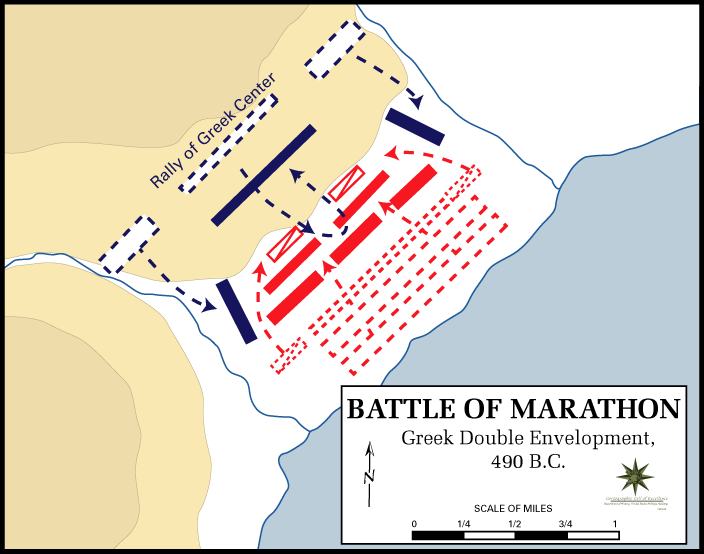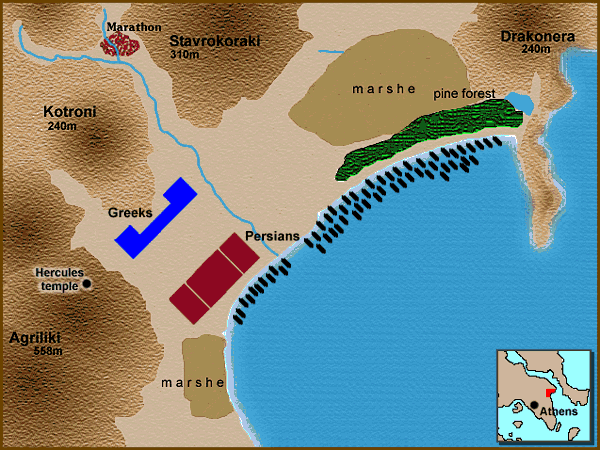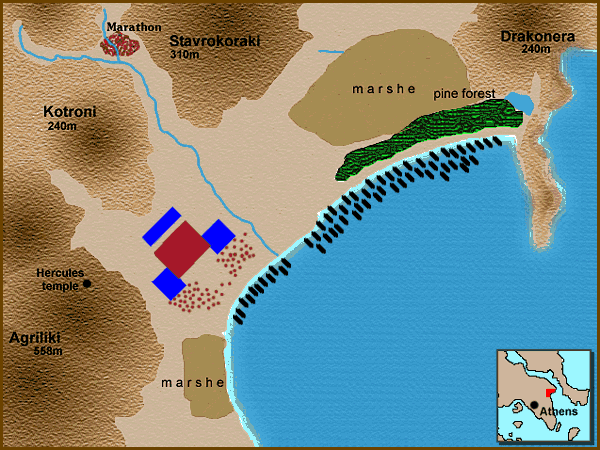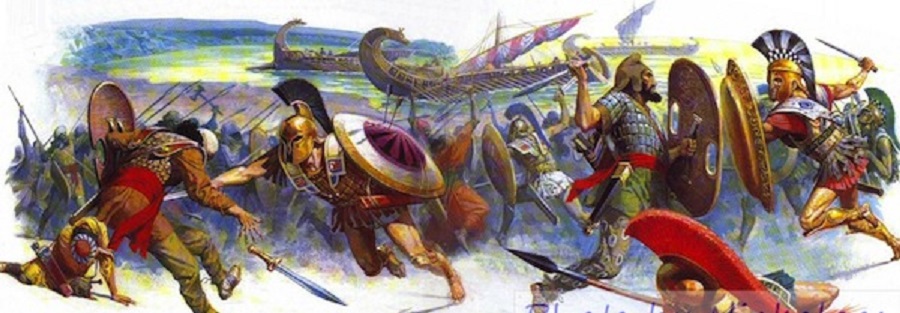Battle of Marathon
Greeks Versus the Persians
On the morning of September 17, 490 bc, some 10,000 Greeks stood assembled on the plain of Marathon, preparing to fight to the last man. Behind them lay everything they held dear: their city, their homes, their families. In front of the outnumbered Greeks stood the assembled forces of the Persian empire, a seemingly invincible army with revenge, pillage and plunder on its mind.
The Athenians' feelings are best expressed by Aeschylus, who fought in the Persian wars, in his tragic play The Persians: "On, sons of the Hellenes! Fight for the freedom of your country! Fight for the freedom of your children and of your wives, for the gods of your fathers and for the sepulchers of your ancestors! All are now staked upon the strife!"
The two sides faced each another directly, waiting for the fight to start. The Athenians stalled for days, anticipating reinforcements promised by Sparta. But they knew they could not wait for long. The Persians, expecting as easy a victory as they had won against enemies so many times before, were in no hurry.
The Greeks, knowing the time for battle had come, began to move forward. Ostensibly, they advanced with focus and purpose, but beneath this firm veneer, as they looked on a vastly larger enemy - at least twice their number - many must have been fearful of what was to come. The Persian archers sat with their bows drawn, ready to loose a barrage of arrows that would send fear and confusion through the Greek ranks.
"The Athenians advanced at a run towards the enemy, not less than a mile away," recounted the historian Herodotus. "The Persians, seeing the attack developed at the double, prepared to meet it, thinking it suicidal madness for the Athenians to risk an assault with so small a force - rushing in with no support from either cavalry or archers."
Had the Persian archers been allowed to loose their bows, the battle might have ended before it had truly begun. Fighting their doubts and fears, the Athenians seized the initiative and rushed the Persians. Confronted by such a bold move and realizing their infantry would be pressed into action sooner than expected must have shaken Persian confidence.

The two Athenian commanders, Callimachus and Miltiades (the latter having fought in the Persian army himself), used their knowledge of Persian battle tactics to turn the tide further in their favor. As the clatter of spears, swords and shields echoed through the valley, the Greeks had ensured that their best hoplites (heavily armed infantry) were on the flanks and that their ranks were thinned in the center. Persian battle doctrine dictated that their best troops, true Persians, fought in the center, while conscripts, pressed into service from tribute states, fought on the flanks. The Persian elite forces surged into the center of the fray, easily gaining the ascendancy. But this time it was a fatal mistake. The Persian conscripts whom the Hellenic hoplites faced on the flanks quickly broke into flight. The Greeks then made another crucial decision: Instead of pursuing their fleeing foes, they turned inward to aid their countrymen fighting in the center of the battle.
By then, the Persians were in a state of utter confusion. Their tactics had failed, their cavalry was absent and their archers were useless. Their more heavily armed and armored opponents, who could sense that victory was close, were attacking them from three sides and pushing them into the sea. The Persians fled back to their ships. Many of the Athenians, buoyed by their success, dragged several of the Persian vessels to shore, slaughtering those on board.
When the day was over, the Greeks had won one of history's most famous victories, claiming to have killed about 6,400 Persians for the loss of only 192 Athenians. The Spartans eventually arrived, but only after the battle was long over. To assuage their disbelief in the Athenians' victory, they toured the battlefield. To their amazement, they found the claim of victory was indeed true. The Athenians had defeated the most powerful empire in the Western world.
Around the 5th century bc, the Persians under Cyrus the Great had rapidly expanded their domain. By the time of Darius I, the Persian empire covered most of southwest Asia and Asia Minor, reaching as far as the easternmost boundaries of Europe. The Persians demanded tribute and respect from all they dominated. The Greek cities in Asia Minor eventually decided to throw off the Persian yoke. Through those revolts, the assistance of the Athenians and the ensuing Battle of Marathon, the wheels had been set in motion to end Persian domination.
How did this sequence of events come to pass? From the time he ascended the throne, Darius, like all the kings before him, needed to conquer and add to the empire that his forebears had passed to him, to establish his worth as a ruler and maintain control. Establishing and retaining authority over such a vast dominion required thousands upon thousands of troops. To pay for the soldiery and to maintain the grandeur of the Persian capital, Persepolis (which Darius built to demonstrate his greatness), he needed more than the tribute from subjugated states. He needed to conquer more cities and territory to expand his treasury.
To the east of ancient Persia (modern-day Iran and Iraq) lay India and the Orient; expansion there held unknown dangers. To take this route, Darius would risk overextending his empire. To the west lay the inhospitable Libyan desert. To the north were the barbarian lands of the Scythians. Expansion into Europe seemed the most promising option, but the scattered city-states of Greece constituted a major roadblock to Darius' ambitions.

Before he could move on Greece, Darius had to achieve complete submission within his existing territories, and an empire of Persia's size was impossible to control centrally. Therefore, the Persians had established local governors or satraps, whose main role was to oversee the day-to-day functioning of their provinces and to ensure that all tribute was collected and sent to the capital. Many of these satraps ruled as tyrants. Understandably, the Greek cities east of the Aegean Sea would become restless and desire change when they cast a glance westward at the seeds of democratic society planted in Athens.
Dissent first began to appear on the island of Naxos, which revolted in 502 bc. The Naxians appealed to the despot of the Ionian city of Miletos, Aristagoras, for assistance. He agreed, meaning to take control of the island once the revolt had been crushed. For his plan to succeed, he enlisted the aid of Artaphernes, Darius' brother and the satrap of Lydia (modern-day Turkey). Aristagoras' tangled web fell apart when the plot against the Naxians failed. Owing the Persian emperor and his brother money and promised conquests, Aristagoras had no option but to incite his own people to revolt.
The revolt of Miletos led other cities to follow suit. The Ionian Greeks had also maintained strong trade and cultural ties with their kin on mainland Greece. Forced to pay tribute to a distant king, feeling the tyrannical push of the Persian governors and encouraged by the Athenians, many of these city-states decided to revolt. Athens sent 20 triremes (oar-propelled warships) to Ephesus. Their hoplites and the citizens of Miletos marched on the Lydian capital of Sardis and sacked it. On hearing of this in Persepolis, Darius was infuriated; according to legend, he instructed one of his servants to remind him three times daily of this Athenian outrage so he would never forget it.
The revolts in Ionia and an excuse to wreak vengeance on Athens gave Darius the perfect pretext to implement his plans of expansion in Europe. When he looked toward mainland Greece, he must have seen a disjointed conglomeration of city-states that bickered and fought among themselves. It must have seemed unlikely that such cities would form any lasting alliances and be capable of repelling a powerful foe. As the ruler with the largest army in the world, and with the success of his predecessors on which to build, Darius must have thought that one way or another victory would be assured.
In 492 bc, Darius gave Mardonius, his satrap in Thrace (northern Greece), command of 600 ships that sailed across the Hellespont (the Dardanelles) and along the coast. As it rounded Mount Athos, however, the fleet was destroyed by a freak storm, an event that would prove to have great significance. The Greeks took it as an encouraging omen that the gods must surely be on their side. Herodotus claims - with questionable accuracy - that the storm destroyed 300 ships and killed 20,000 men.
Two years later, Darius sent another 600 ships in a second attempt. Expecting little resistance, he sent emissaries to the cities of Greece asking for their submission and demanding offerings of earth and water. Most cities in the north and in Macedonia submitted to his demands. But war became inevitable when the Athenians refused, and the Spartans went even further and killed the Persian envoy.
A second Persian expedition was launched under the command of Datis and Darius' nephew, Artaphernes. As they moved across the Aegean, they subdued many of the island cities such as Naxos and Delos. Eventually they reached Eritrea, a large island off the Attic coast, and made their way to Marathon. Herodotus explains why the Persians chose to land at Marathon: "The part of Attic territory nearest Eritria - and also the best ground for cavalry to maneuver in - was at Marathon. To Marathon, therefore, Hippias directed the invading army, and the Athenians, as soon as the news arrived, hurried to meet it."
Marathon was also chosen to draw the Athenians away from Athens. While the hoplites were engaged on the field, the Persians planned to send their ships around the coast and easily capture the undefended city. The Persian plan was twofold: They knew that if the Athenian army was defeated outside of Athens, the city's civilian inhabitants would have no choice but to submit.

Almost immediately after hearing the news of the Persian landing, the Athenians sent a runner named Pheidippides to Sparta to ask for their assistance. The Spartans promised to send aid, but with a major qualification: No help would be forthcoming until the Carneia (a religious festival) was over. The Spartan refusal to commit troops before then left the Athenians with three choices: march out and meet the Persians at Marathon; defend the pass at Pallini; or stay in the city and defend its walls.
The Athenians chose Marathon. There were several reasons for this. The food supplies they would need to survive a protracted siege came from the surrounding countryside of Attica, which could easily be cut off by the encamped Persian army. The soon-to-be-vaunted Athenian navy was at that time little more than a flotilla and had no chance of defeating the Persian fleet. If the Persians were able to blockade both the land and sea, Athens could not withstand a sustained siege. The pass at Pallini was high in the mountains, but the Persians had sufficient forces to continue to attack pass defenders until Pallini fell.
Confronting the Persians at Marathon offered the Greeks several tactical possibilities. As stated by Herodotus, the geography of the plain of Marathon was significant in the Persian decision-making. Measuring approximately 10 miles long and three miles wide, it was flanked by boggy marshlands. A large, flat plain, it was perfect for the use of the Persians' main strike weapon: cavalry.
When the Athenians reached Marathon, they found the Persians camped along the coast. Obviously, the Greeks needed to take the high ground. Both sides sat encamped for nine days, each waiting for the other to make the first move. The Persians believed that the longer they stayed, the greater the fear that would rattle their opponents.
The outnumbered Athenians and their Plataean allies played for time in hopes that the Spartan hoplites would join them - not only to strengthen their numbers but because Spartan military renown stretched all the way to Persepolis, and a Spartan presence would surely dent Persian confidence. On the other hand, the longer the Persians stayed, the more cities would submit to them, lowering the confidence of the Athenian troops.
A meeting was held in the Greek camp to resolve the issue. The 10 Athenian generals (each of the original tribes that had first formed Athens had an elected general) voted, with five in favor of immediate battle and five voting to wait for the Spartans' arrival. According to Herodotus, it was the influence of Miltiades that swayed the decision. "With you it rests, Callimachus," he allegedly said, "either to lead Athens to slavery or, by securing her freedom, to leave behind to all future generations a memory far beyond even those who made Athens a democracy. For never since the time the Athenians became a people were they in so great a danger than now." Whether Miltiades was as influential as Herodotus made him out to be is uncertain; however, Callimachus voted in favor of starting the battle. Herodotus also stated that while each general normally took a daily turn in overall command, many of the lesser generals handed their turn over to Miltiades.
With approximately 1,000 Plataeans bolstering the Athenian ranks, the Hellenic forces mustered some 10,000 hoplites. The Persians may have numbered as high as 48,000. Familiar with the tactics and strengths of their enemy, the Greeks knew the Persian cavalry had to be taken out of the calculations. The Persians could not use the cavalry on one side because of the marshland. Nor could they use it on the opposite flank, as the Athenians had buried large stakes in the ground. It seems likely that the Persians, even without the use of either flank, would have used their premier weapon, but for whatever reason, the Persian cavalry was away from the battlefield. Miltiades may well have learned of the Persian cavalry's absence and then decided it was time to attack.


The absence of Persian cavalry is one of the reasons for the Greek victory. The second is that the Persians were completely unprepared for and unable to adapt to the Greeks' tactics. Persian battle tactics that previously had served them well entailed stationing their archers at the front to fire volley after volley of arrows into the enemy ranks, wreaking havoc and instilling fear. Once that objective was achieved, Persian infantry would move in to slaughter the confused opposition, with cavalry used only to complete the task when the enemy was routed.
The Greeks held an advantage at Marathon in the equipment of their infantry. An Athenian hoplite carried a heavy, 9-foot spear, wore a solid breastplate and carried an almost body-length shield. The Persian infantryman, in contrast, wore little more than robes and carried a shorter sword and a wicker or cane shield. Therefore, close-quarter combat favored the Athenians. The Persian disadvantage was exacerbated by the Greek use of the phalanx formation - an eight-hoplite by eight-hoplite square. The hoplites at the front would interlock their shields, as would the men to the side, forming an almost impenetrable barrier. Because of their lesser numbers, the Greeks had to thin their formation out, but even that would eventually further serve their purpose.
Although they had won a great victory, the Athenians knew the Persian threat had not passed, and they quickly marched back to prepare the defense of Athens from the attack they were certain would come. In an amazing feat of strength and endurance, they marched at double time directly from the battlefield and managed to reach the city before the Persian ships arrived.
With time of the essence, the Athenians dispatched Pheidippides to inform Athens' populace of their victory before the troops arrived. The tale goes that after running the 26 miles from Marathon to Athens, Pheidippides exclaimed: "Rejoice! We conquer!" then died from exhaustion. Whether true or not, that is the source of the modern-day marathon race; the distance of the modern race reflects the distance Pheidippides ran.
Even though the future battles of Salamis and Plataea were fought against a greater Persian threat, had Marathon ended in defeat, those later battles would never have occurred. Themistocles, who fought at Marathon, saw that Athens had been lucky the first time, and had the Persians conducted their campaign differently, the outcome might well have been different. Hence, soon after Marathon he successfully petitioned to have Athens build a stronger navy, which led to its success at Salamis.
Marathon smashed the myth of Persian invincibility, an achievement that lent a critical measure of confidence to the Greeks who fought the Persians again at Salamis and Plataea. It meant that many of the same commanders who served at Marathon were at the later battles and had knowledge of the Persian mind, and in the longer term, it would lead Alexander the Great on his conquest of Asia and the eventual decline and downfall of the Persian empire.
While most credit the second installment of the Persian wars with the birth of the Athenian renaissance, one could argue that Marathon was the catalyst for, and much of the reason behind, the Athenians' belief that they were on par with the Spartans - which allowed them to flourish. Had Marathon been a defeat and Athens annihilated, the Western democracy, culture, art and philosophy that developed from this period in history might have been lost, and the Western world today could be very different.













